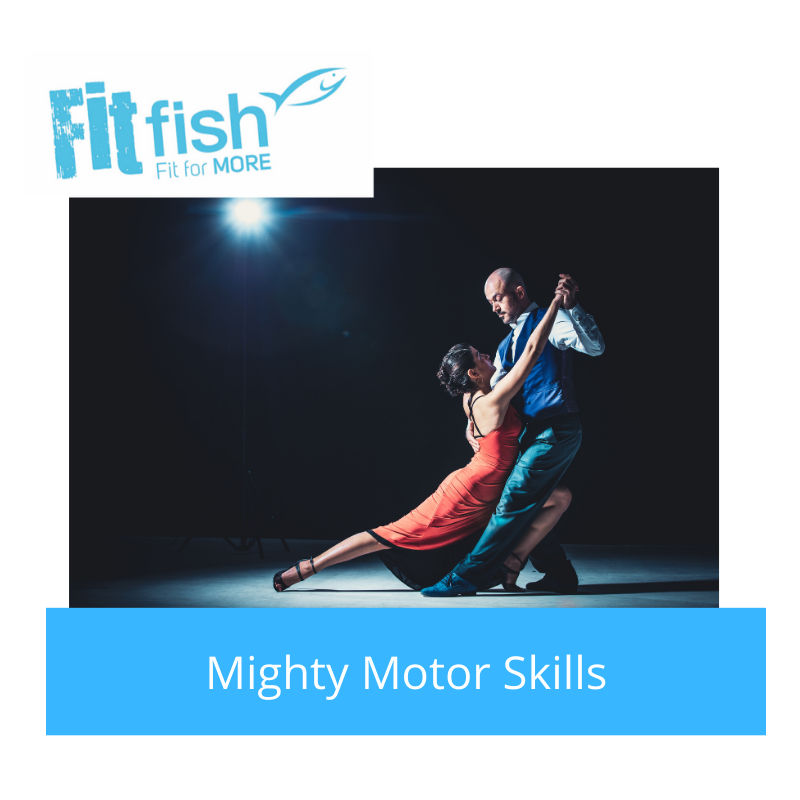Mighty Motor Skills

When it comes to information about exercise, you may hear or read lots about things like cardio, resistance work, muscle work, flexibility, strength or stretching, but ‘motor skills’ may well be something you don’t come across very often. So, what are motor skills? Watch the video or read on to find out more!
The official definition of motor skills is “the ability to make movements that are necessary to complete or master a prescribed action or task”. They include things like agility, balance, coordination, speed, reaction time and power.
Agility is your ability to adapt and get to different places and into different positions. Balance is keeping your centre of gravity central so that you don’t fall over. Coordination is the ability to use different parts of your body together smoothly and efficiently, for example the combination of movements you make playing racket sports or catching a ball.
Speed is how fast you move, and reaction time is how quickly you can respond to an external stimulus, for example, how long it takes you to start running in a race once the whistle blows. And finally, power, which is about getting from ‘zero to hero’, not necessarily a measure of how strong you are in general, but how powerful you can be in one single movement.
Why are motor skills important? You may think they are only actually useful if you are training to be a professional athlete or want to get better at a particular sport. But in reality, they can be helpful for all of us. They can help us to do more in the present and prevent injury in the future, because the more balanced, the more coordinated, the more agile we are and the more quickly we can react, then the less likely we are to injure ourselves.
For example, you might trip over the leg of your trousers, but if you’ve got good balance and good core strength you will be able to pull yourself back instead of falling over. Similarly, if you’ve got a good reaction time, you can avoid something coming at you that might have caused an injury. So, it’s important for all of us to keep on top of these skills as much as we can to give ourselves the best chance of living a healthy, whole life.
You might notice that children’s motor skills develop as they get older. Younger children may be clumsy, and they often struggle with doing the finer things, like picking up small objects, or writing. If you are pregnant, then your centre of balance is different to normal, so you can come across as slightly more clumsy and less agile, because things have changed. If you are elderly, you may not have such fast reactions or be quite as balanced or coordinated as you once were.
But, there are still ways to minimise the impact of these small decreases in our motor skills, to give ourselves the best chance to prevent injury in the future. We can save ourselves from falls; we can move out of the way of something, we can be more agile and balanced, more able to look after ourselves and do everything that we are meant to do.
How can we improve our motor skills? It’s all about practice and variety. You might have really good motor skills in one area of life. For example, you might be really good at table tennis or tennis and be really agile and have good coordination because you practice. Being good at tennis won’t automatically make you good at everything else, but it will set you up well for another completely different activity. And so what we can do is pick something to practice with.
Take learning to dance as an example. First, you’ll go through the cognitive phase, where you really have to concentrate hard on every movement. You may have all the steps in your head, but you will make lots of mistakes as you’re trying to translate them down to your feet. Then you go through the motor stage where, you still make the odd mistake, but you are starting to get it. And finally the moves become automatic and you can go out onto the dance floor and do the dance without really having to think about it.
So, we can all go through that process with different things. You could tape out a line on the floor and practice walking on it, you could practice balancing a book on your head and walking around, you could practice standing on one leg, or maybe try a racket sport or throwing a ball against the wall. Whatever you choose, if you practice you will move from the cognitive stage to the motor stage and through to the automatic stage.
And getting good at one skill will help you when you pick something new to practice as well. So, choose something to do and see if you can improve your motor skills; you’ll notice lots of benefits if you do. You’ll be fitter and stronger for what lies ahead of you and hopefully less likely to fall or become injured.
If you would like to join us for any of the Fitfish Online Exercise classes we’d love to see you there – we include lots of motor skills in all of our sessions!
Comments
Add comment